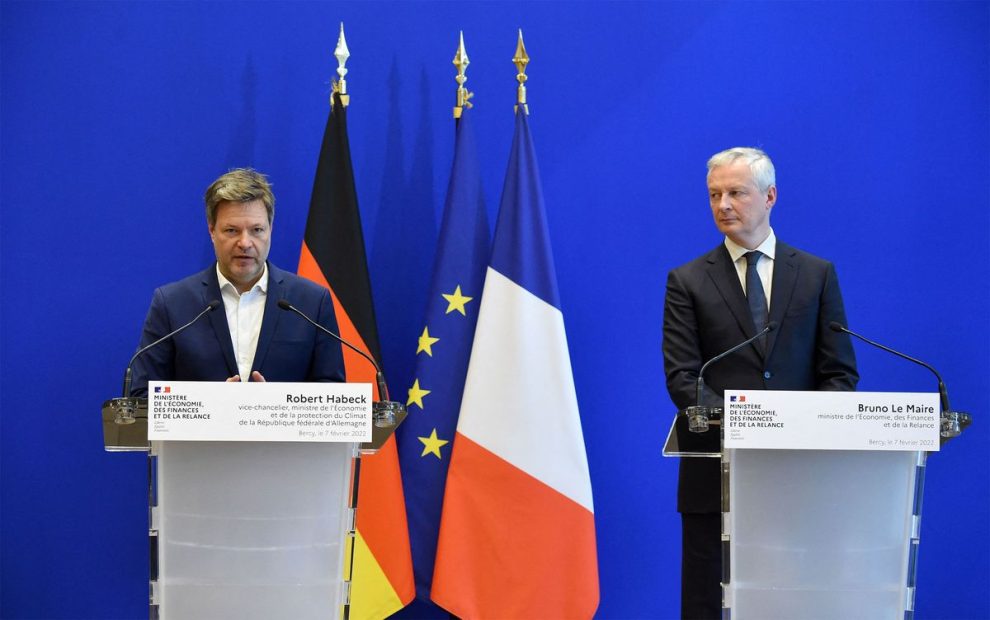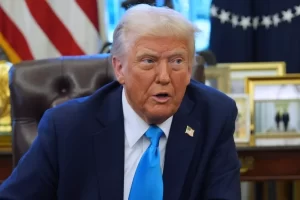EU’s top economies leave behind their recent tensions to push for EU action amid trade war fears.
Germany and France pushed Tuesday for tougher industrial policies such as more state subsidies for European businesses to counter the threat from U.S. reforms that risk triggering a transatlantic trade war.
The EU’s two leading economies put aside their bad blood of the past weeks to issue a joint statement vowing to « explore industrial policy possibilities » to safeguard European industries from discriminatory trade measures from Washington and also Beijing.
The declaration, which comes after two days of high-level ministerial meetings in Paris — including French President Emmanuel Macron inviting German Foreign Minister Annalena Baerbock and Economy Minister Robert Habeck to the Elysée Palace — signals an escalation of European efforts to protect home-grown manufacturing from the threat of unfair competition from the U.S.
Paris and Berlin are increasingly frustrated that U.S. President Joe Biden’s administration is showing little interest in addressing their concerns about the Inflation Reduction Act, a $369 billion package of subsidies and tax breaks to boost American green businesses. From a European perspective, the American act is a protectionist measure because it encourages companies to shift investments from Europe and incentivizes customers to « Buy American » when it comes to purchasing an electric vehicle.
Yet with only six weeks left before the final provisions of the U.S. law enter into force on January 1, and negotiations for a peace deal with Washington yielding little progress, the government in Berlin is increasingly convinced that it must join forces with Paris and back a French push for a more subsidy-based EU industrial policy, as POLITICO first reported on Saturday.
The goal: Create better business conditions to ensure that Europe remains an investment location for crucial future green technologies such as batteries, hydrogen or solar panels.
On Tuesday, this new industrial policy alliance between Berlin and Paris began to take shape in form of a joint statement by Habeck and his French counterpart Bruno Le Maire.
« We call for an EU industrial policy that enables our companies to thrive in the global competition, » the statement reads, adding that « we want to coordinate closely a European approach to challenges such as the United States Inflation Reduction Act. »
Although the statement avoids directly using the word « subsidies, » it speaks instead of the need to « explore industrial policy possibilities to prevent downside effects of protectionist measures by third countries » and to « build a European platform of transformation technologies. » The text also calls on the European Commission to speed up procedures to approve subsidies under the so-called Important Projects of Common European Interest (IPCEIs).
However, the text stresses that any EU state aid measures must be in line with World Trade Organization rules, which means they should not discriminate against foreign investors.
The Franco-German push, which follows recent tensions between both countries, comes amid growing fears in Berlin that the American act, as well as the high energy prices in Europe, will cause a growing number of companies to halt investments or even close business in order to move to the U.S. or China instead.
Last of the Mohicans
« We have entered a new globalization, » Le Maire said. « China has been in this globalization for a very long time with massive state aids that are reserved exclusively for Chinese products, the fact is that the U.S. has just entered this new globalization before our eyes to develop its industrial capacity on American soil. Europe must not be the last of the Mohicans. »
Germany, meanwhile, remains concerned that any response to the U.S. law doesn’t trigger a trade war. German Chancellor Olaf Scholz warned on Tuesday of “an overbidding competition in the area of subsidies and protective tariffs, such as some see coming our way as a result of the U.S. Inflation Reduction Act. »
Speaking at an economic summit in Berlin, organized by German newspaper Süddeutsche Zeitung, Scholz also suggested that a limited EU-U.S. trade agreement could help to defuse such tensions. « We should also take another very close look at the idea of an industrial tariff agreement with the United States, » Scholz said.
U.S. officials have urged the EU to avoid engaging in any trade spat with Washington and suggested that Europe should instead copy the U.S. subsidy model for its own industries.
Source: Politico.EU































